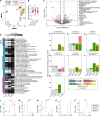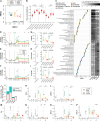Host origin of microbiota drives functional recovery and Clostridioides difficile clearance in mice
- PMID: 40454811
- PMCID: PMC12239565
- DOI: 10.1128/mbio.01108-25
Host origin of microbiota drives functional recovery and Clostridioides difficile clearance in mice
Abstract
Colonization resistance provided by the gut microbiota is essential for resisting both initial Clostridioides difficile infection (CDI) and potential recurrent infection (rCDI). Although fecal microbiota transplantation (FMT) has been successful in treating rCDI by restoring microbial composition and function, mechanisms underlying the efficacy of standardized stool-derived products remain poorly understood. Using a combination of 16S rRNA gene-based and metagenomic sequencing alongside metabolomics, we investigated microbiome recovery following FMT from human and murine donor sources in a mouse model of rCDI. We found that a human-derived microbiota was less effective in clearing C. difficile compared to a mouse-derived microbiota, despite recovery of taxonomic diversity, compositional changes, and bacterial functions typically associated with clearance. Metabolomic analysis revealed deficits in secondary metabolites compared to those that received murine FMT, suggesting a functional remodeling between human microbes in their new host environment. Collectively, our data revealed additional environmental, ecological, or host factors to consider in FMT-based recovery from rCDI.
Importance: Clostridioides difficile is a significant healthcare-associated pathogen, with recurrent infections presenting a major treatment challenge due to further disruption of the microbiota after antibiotic administration. Despite the success of fecal microbiota transplantation (FMT) for the treatment of recurrent infection, the mechanisms mediating its efficacy remain underexplored. This study reveals that the effectiveness of FMT may be compromised by a mismatch between donor microbes and the recipient environment, leading to deficits in key microbial metabolites. These findings highlight additional factors to consider when assessing the efficacy of microbial-based therapeutics for C. difficile infection (CDI) and other conditions.
Keywords: Clostridioides difficile; fecal microbiota transplant; gut microbiome; metabolomics; metagenomics; recurrence.
Conflict of interest statement
V.B.Y. is a consultant for Vedanta Biosciences.
Figures





References
-
- Theriot CM, Koenigsknecht MJ, Carlson PE Jr, Hatton GE, Nelson AM, Li B, Huffnagle GB, Z Li J, Young VB. 2014. Antibiotic-induced shifts in the mouse gut microbiome and metabolome increase susceptibility to Clostridium difficile infection. Nat Commun 5:3114. doi: 10.1038/ncomms4114 - DOI - PMC - PubMed
MeSH terms
Substances
Grants and funding
LinkOut - more resources
Full Text Sources
